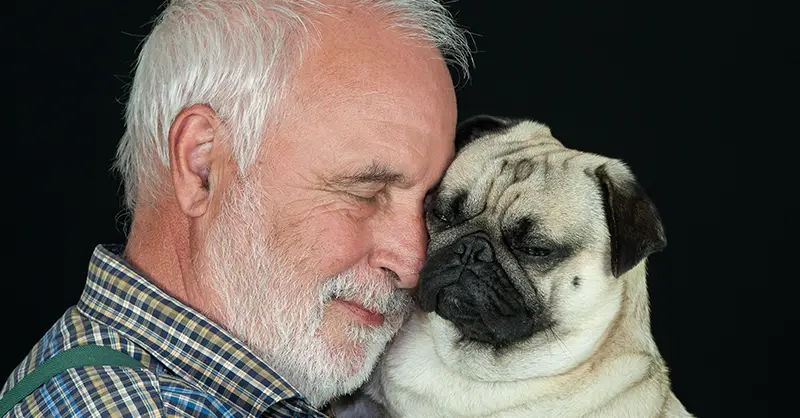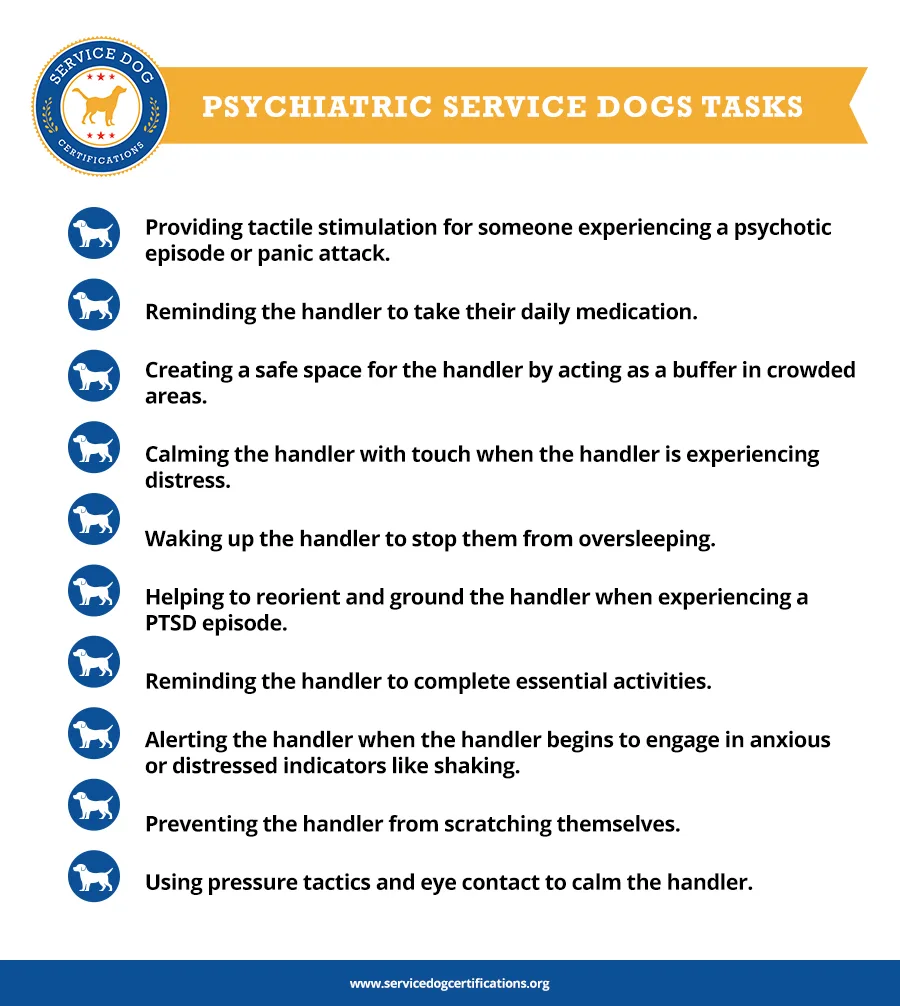Home Page › Blog › Can Psychiatric Service Dogs Help Geriatric Mental Health?
Can Psychiatric Service Dogs Help Geriatric Mental Health?

Older adults have always made vital contributions to society, family, and history, yet they struggle increasingly with loneliness, depression, and other mental or neurological disorders. According to the World Health Organization (WHO), roughly 20% of older adults aged 60 or over have a mental health disorder. To ensure the safety and health of this population, it’s essential to identify ways to address their mental health concerns. One way to help older adults is with psychiatric service dogs.
What is a Service Dog?
Emotional support dogs (ESA), therapy dogs, and service dogs help people with mental or emotional disabilities or disorders. Of these three, only handlers of service dogs maintain the rights under three federal laws:
These federal laws protect the right of people with disabilities to have their service dogs with them at all times. Whether it’s in a public park (ADA), on an airplane (ACA), or in a “no pets allowed” apartment (FHA), service dogs are able to remain with their handler. Unlike other animals, service dogs can enter and stay in public areas where pets are not allowed.
According to the ADA, a service dog must:
- have specific service dog training that completes an essential task for a particular disability.
- assist with accomplishing a vital daily activity for a person with a qualifying disability.
- be essential to their handler.
A few examples of service dogs are:
- Mobility assistance dogs
- Guide dogs for people who are vision impaired
- Diabetic alert dogs
- Autism support dogs
- Psychiatric service dogs
Although older adults may benefit from any of the service dogs listed above, psychiatric service dogs are ideal for helping those with mental health conditions.
What is a Psychiatric Service Dog?
Psychiatric service dogs (PSD) are specially trained to help people with psychiatric or neurological disabilities. A PSD may receive training to help older adults in the following ways:
- Obtain medication during psychiatric emergencies or severe depression.
- Alert their handler to medication administration times.
- Serve as a physical barrier between their handler and a distressing situation or object.
- Enter a room before their handler to ensure safety.
- Guide their handler to the designated exits during an emergency.
- Awaken their handler when their handler is groggy from medication.
- Wake their handler from nightmares.
- Prompt their handler to eat or bathe.
- Prompt their handler to exercise or perform a healthcare task.
- “Ground” – reducing anxiety through tactile stimulation – their handler when their handler becomes overwhelmed or distressed.
- Lead their handler to safer areas.
- Obtain assistance when their handler falls into an emergency situation.
The list above only offers a brief snapshot of tasks a psychiatric service dog can perform for older adults. Which job a PSD is ultimately trained for depends on the needs of their handler.
Older Adults and Mental Health
It’s just as essential for older adults to get help for their mental health as it is for younger adults. For example, according to the Centers for Disease Control (CDC), older adults have a higher risk for depression than the general population.
- Roughly 80% of adults over 60 have at least one or more chronic illnesses, and adults with a chronic disease are at a higher risk for depression.
- About 1% to 5% of older adults have major depression.
- The rate of major depression is higher in older adults who require home healthcare (13.5%).
Adults over the age of 60 are also more prone to developing Alzheimer’s disease, a progressive disease resulting in memory loss. The CDC states that the number of older people with Alzheimer’s disease doubles every 5 years after age 65. People with Alzheimer’s may forget to take medication, get lost from home, or become irritable or depressed.
In the United States, loneliness among older adults is becoming a problem. One in three older adults struggles with loneliness. Although social isolation may contribute to loneliness, being alone is not always a factor. Some older adults who live surrounded by family and friends may still feel lonely. According to the World Health Organization, loneliness can lead to depression, negatively impact the quality of life, and shorten a person’s life span.

How Can Psychiatric Dogs Help Geriatric Mental Health?
People seeking solutions for mental health problems in the elderly may find that psychiatric service dogs are excellent alternatives. They are great companions, and PSDs serve as a valid assistive option for older people with mental health disabilities. By offering both company and physical assistance, a psychiatric service dog can significantly alleviate psychiatric and neurological symptoms.
Can Psychiatric Service Dogs Help with Dementia?
PSDs help adults with Alzheimer’s disease or dementia safe in several ways. They can be trained to assist in routine activities like eating, dressing, or taking medications. A psychiatric service dog can also prompt people with dementia to perform their regular daily routines, which can help improve an older person’s quality of life. A psychiatric service dog can prevent an older adult from wandering or getting lost, either by guiding them home or alerting others. Additionally, a GPS locator can be attached to a PSD’s vest or collar, helping to alert loved ones if their older relative wanders away.
Do Psychiatric Service Dogs Reduce Symptoms of Depression or Anxiety?
Pet owners are typically less lonely than non-pet owners. However, psychiatric service dogs are more than pets. Although they do provide a close presence, they also perform tasks that can assist an older person in times of need. Normal pets can sometimes overwhelm older adults with mental illness because pets aren’t trained to work with their diagnosis. PSDs, on the other hand, are trained for the specific purpose of working with individuals who have a psychiatric or neurological health conditions. The dog will know when to jump into action and help their handler, making them an indispensable part of the handler’s life and safety.
Psychiatric Service Animals and Mental Health Services
A 2019 study published in the journal Frontiers of Veterinary Science found that 46% of psychiatric service dog owners saw their need for mental health services decrease. These PSDs typically performed more than one task for their owner, from grounding (94%) to blocking other people (42%). For older adults, a PSD can be a life-changing experience while also reducing the need for health services.
Improving Geriatric Mental Health with a PSD
Caring for the elderly shouldn’t only consist of doctor’s visits, medications, and hospital beds. Sometimes, including treatments that are outside the box — like utilizing a psychiatric service dog — can reduce the need for medical care and keep older adults safe. A psychiatric service dog can not only help geriatric mental health, but it can boost their physical health and overall satisfaction with life.
See if your mental disability qualifies for a psychiatric assistance dog. Get an PSD Letter assessment from a licensed medical professional.
About the Author: The writing team at Service Dog Certifications is made up of folks who really know their stuff when it comes to disability laws and assistance animals. Many of our writers and editors have service dogs themselves and share insights from their own experiences. All of us have a passion for disability rights and animals.
Latest Posts

How to Bring a Service Dog to Disneyland
Trained service dogs are more than welcome to join their handlers at Disneyland. In this guide, we’ll explain Disneyland’s policies and give practical advice for bringing a service dog to Disneyland for the first time. Disneyland’s Service Dog Policies The Magic Kingdom is happy to welcome trained service dogs across most park locations! They kindly […]

Read More

Can Dogs Eat Tomatoes?
Yes! Dogs can safely enjoy tomatoes, but there are a few risks to be aware of so you can feed your dog responsibly. Fully ripe tomatoes (without the stems and leaves) can actually have nutrients that are good for your pup. Tomatoes have chlorogenic acid, an antioxidant that can have anti-inflammatory effects in cells. They’re […]

Read More

Can a Primary Care Doctor Write an ESA Letter?
Your family doctor, also called a primary care physician (PCP), can write a letter recommending an emotional support animal. We’ll explain what legally gives them that ability and explore what better options might be available for you. Why are Physicians Able to Write an ESA Letter? To turn your pet into an emotional support animal, […]

Read More








